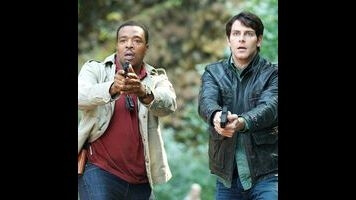Grimm: “The Other Side”

Early in its run, Grimm used its epigraphs as a way to introduce whatever fairy tale was the topic of the episode’s major plot. As the show progressed, the epigraphs became indicative of some thematic resonance between a tale and an episode. Now, the writer’s seem to be combing any and all fairy tale-adjacent material for quotes to fit a plot that never sprang from the Grimm tales themselves. I understand why the source material can be limiting, but the writers have shown a range of literary influences. Episodes that contrast strong in-show mythology with a scramble to tie in fairy tale elements shows how over-complication of this world may not be playing to Grimm’s advantage.
The epigraph comes from Carlo Collodi’s The Adventures of Pinocchio, but the three plot threads have very little to do with that story. I haven’t seen the episode of Once Upon A Time that brought in the Pinocchio story, but I don’t think it’s a stretch to say that Grimm wasted its chance with that popular story.
Geppetto designs himself a marionette for a son, but in translating that story to Portland Grimm buries the creator in the form of a controlling scientist mother who genetically engineered her son Pierce in utero, giving him both her lizard-like Wesen form and a dangerous Löwen. An academic decathlete competing with a group of other gifted students for one spot, Pierce’s Löwen side takes over in order to weed out the competition, but he blacks out whenever that altered form takes over, and has no idea what he does.
As a new concept introduced into the world of Grimm, I found this very interesting. Mixing modern technology like gene splicing in with the folklore and mysticism offers a lot of intriguing possibilities, but Grimm already has a problem with weaving too many elements into its mythology. Add to that the simplistic plot of a student taking out academic rivals—I mean, this isn’t anything new, even Hey Arnold did a twist on it with Helga scheming to get the role of Juliet in Romeo and Juliet—and the case of the week only offers compelling details.
But as with so many episodes of Grimm, a couple minor intriguing elements keep me optimistic about the long-term narrative. For the first time, Renard and Monroe’s paths cross, as the Captain seeks a way to curb his obsession with Juliette after kissing her awake. His two appearances in Rosalee’s shop to talk with Monroe were the best in the episode, as Monroe couldn’t quite figure out if he recognized Renard, but explained that his condition will worsen if a there isn’t a dual treatment. I’m surprised that Renard risks going out in the open, since he’s been very careful about keeping his identity hidden from anyone, but after driving Juliette home, following her into the house, nearly running someone over with his car while fleeing, and then punching the innocent guy, he realizes that the situation isn’t completely under his control. A desperate and unrestrained Captain Sean Renard points to a confrontation with Nick sooner rather than later, and in that regard this development is a good one.
On the even more overarching front, Adalind meets Renard’s brother Eric, and reveals her vengeful intentions. There isn’t a lot of detail here, but what does become clear is Adalind’s cat hex on Juliette has much bigger ramifications. I’ve been impressed with how the show builds its own magical hierarchy and slowly reveals the power of spells, potions, and those elements, but at times they can be poorly defined or clunky. It's still unclear precisely how the magic in the show works, but at least Rosalee and Adalind's knowledge and abilities are compelling. For his part, Eric offers up a bit of baby half-brother Sean's backstory: he's the bastard son of a royal and a hexenbiest. His mother is unknown, but there's now a bit more light on Renard's dark past, and getting him more intricately involved in the Wesen side of the story has worked well so far.
I should be more discerning than this. While re-watching Buffy episodes I want to watch episodes with main plots that I care about, not all the little details that saved what was otherwise kind of a bore. That’s how I feel about “The Other Side.” It had some utterly ridiculous transitions, namely the random introduction of a completely superfluous intern who falls over a garbage can and gets laughed at, followed by an immediate cut to Vienna, Austria as Adalind introduces herself to Eric. And the final fight scene in Pierce’s house follows the weird pattern of breaking everything remotely possible to crush into pieces within one scene. The little things keep me hopeful that Grimm will get it together when it brings the major power players together, or as it turns up the heat on this Renard/Juliette situation when Adalind gets back on the front lines. But the episodic plots need more ingenuity, because right now cookie cutter crime procedural plots spiced with an epigraph isn’t cutting it.
Stray observations:
- Monroe brings comic relief at just the right time in each episode, this week getting a little too technical on green tea preparation techniques with a customer.
- One glaring weakness of this week’s episode is how it keeps Nick, Hank, and Monroe apart the entire time. Sure, the Monroe/Renard stuff is interesting for a week, but the second he talks to Nick about it…doesn’t the mystery unravel?